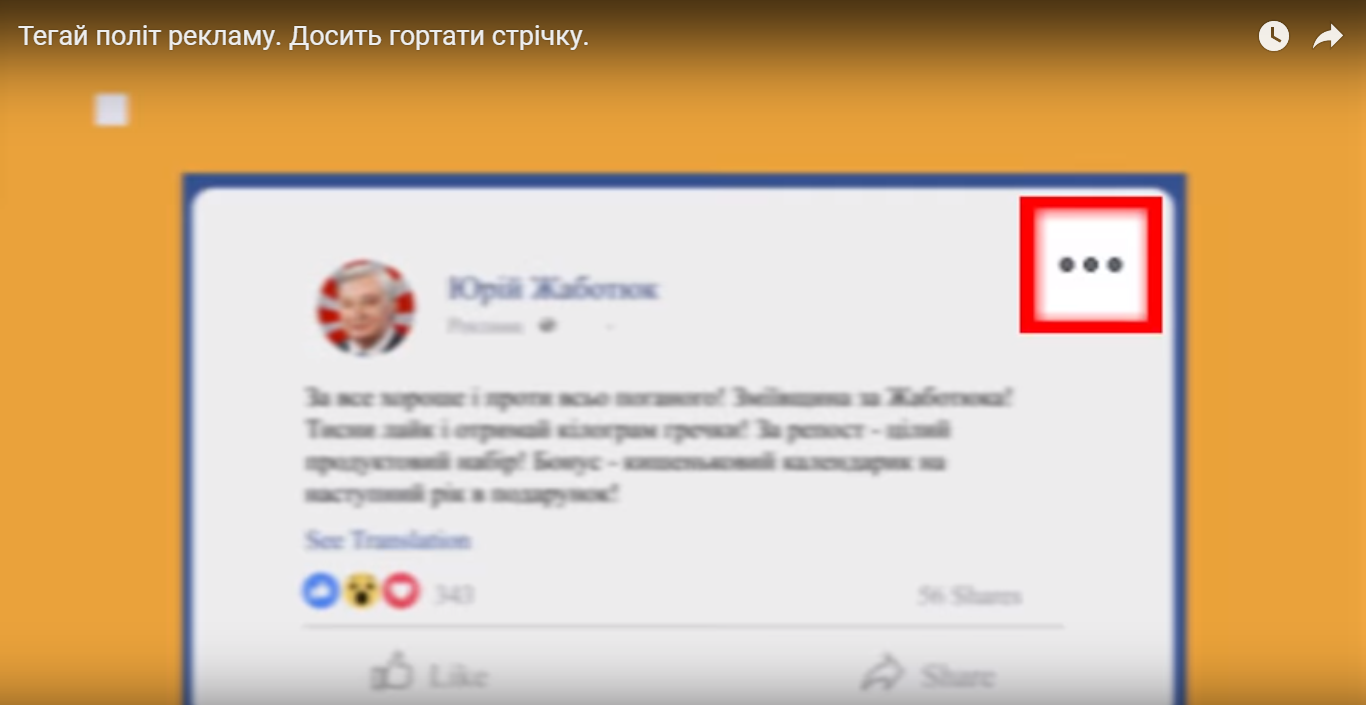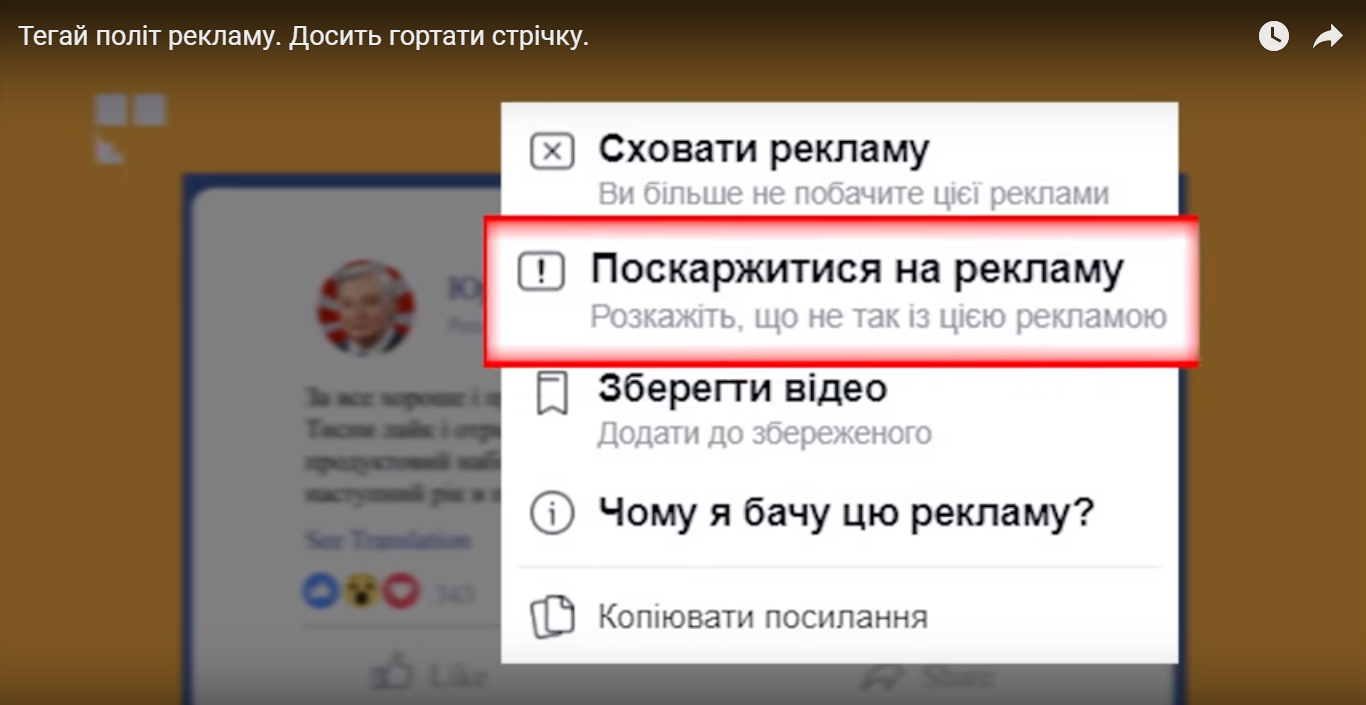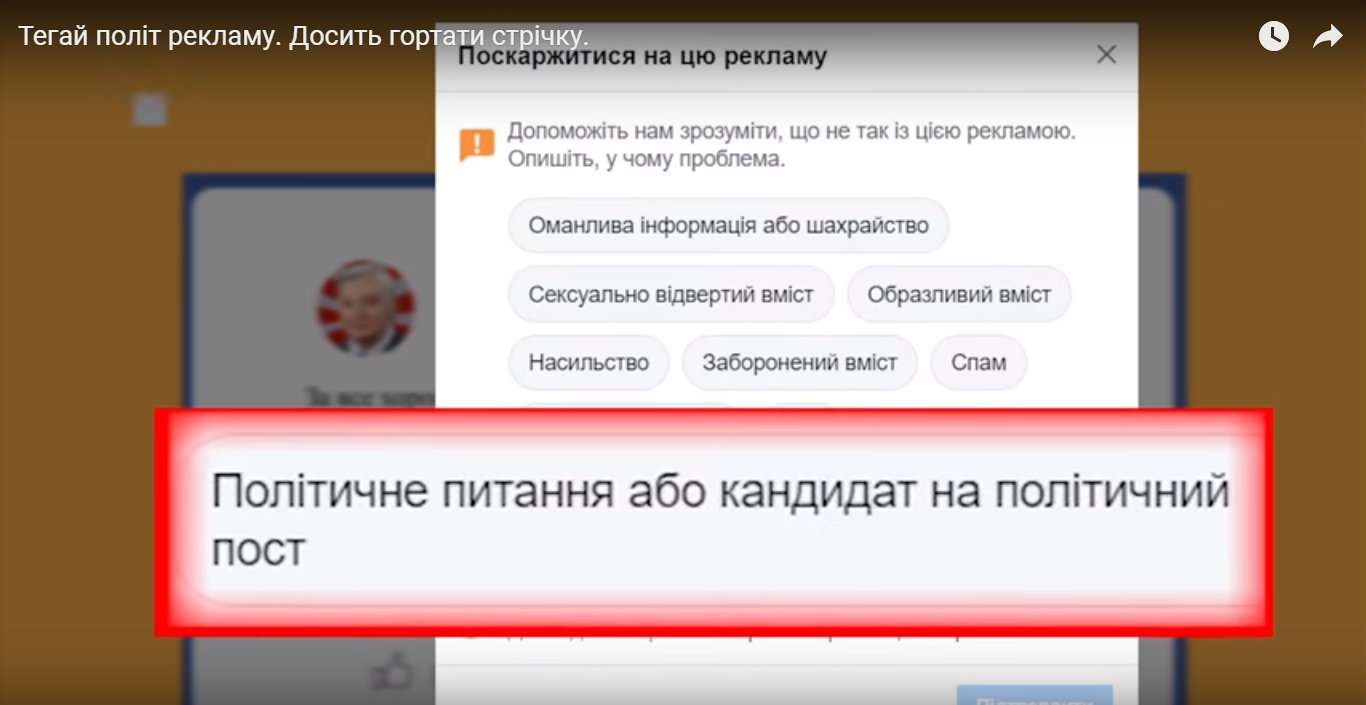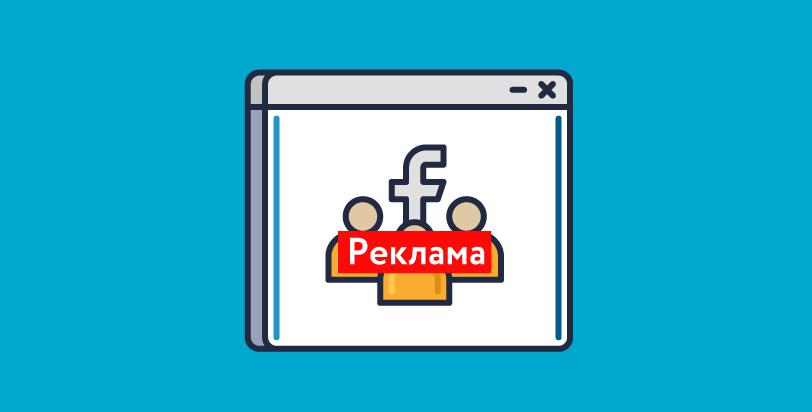Ukrainian politicians run their campaigns in social media by making use of a loophole in electoral law.
OPORA explored the pre-election campaigning on Facebook during the 2019 presidential race. It was found that parties and candidates have not declared in their official reports dozens of millions of hryvnas spent for ads in the social media. It breaks electoral standards but the law on elections does not provide any sanctions for politicians hiding their finance for social media campaigning or pay for it other than from the election fund. To address the issue, change is needed into the law. However, each Internet user can help make political ads more transparent – it would suffice to make three clicks with your mouse.
Why Do Politicians Use Facebook Ads for Campaigning?
Briefly put, it is relatively cheap, efficient, risk-free, and offers a broad range of freedom in actions. Facebook is the most popular social media in Ukraine, with increasingly bigger coverage and the number of users. Ads can be targeted for specific audiences, such as for residents of a certain constituency, for women of pre-retirement age or for users who have liked the candidate’s page. Statistics of ad views and reactions to posts is very precise. It can be used to design more specific and efficient messages for each target audience.
Moreover, most restrictions set by election law for pre-election campaigning are not de facto valid for social media. Until recently, it has been impossible to stop the discrediting campaign on Facebook, or know who paid for the ad. Before the 2019 elections, the social media set stricter rules: now, the community may control how much money was spent by politicians, what they advertise and who they target in their ads. Since March, 18, 2019, all ads related to politics have been saved in the Political Ads Library.
Are the Expenses on Political Ads on Facebook Entirely Transparent?
OPORA monitoring shows it is no quite so. There are no yet any available efficient control mechanisms for expenses and compliance of candidates and political parties with campaign finance requirements in social media.
Over the period of the 2019 official parliamentary campaign, from May, 24, to July, 15, 40,500 political ads have been posted on Facebook. 72% of posts were published in the two weeks in July. The total costs for political ads amounted to USD 1.8 mln (almost UAH 50 mln.). Over a million was spent on pages promoted by political parties and leaders of party lists, 500,000 of them were promoted by majoritarian candidates.
In the final financial statements, almost all political forces either reported much lower amounts than their expenses on Facebook ads, or failed to mention them at all. No expenses on Internet ads have been declared by the “Syla Prava”, “Batkivshchyna,” “Oppositional Platform — For Life,” “Groysman Ukrainian Strategy,” “Oppositional Block,” “Mykhaylo Saakashvili New Forces Movement,” “Radical Party,” “Nezalezhnist,” “All-Ukrainian Union Fakel.”
According to OPORA estimates, 18 parties actively campaigning on Facebook spent about UAH 31 mln. According to the reports, these are only UAH 17 mln.
“Holos” and OPFL failed to declare UAH 1.5 mln each, “Batkivshchyna”— 2.3 mln., “Shariy Party” — over 1.3 mln., “Servant of the People” — almost 800,000. “Syla Prava” spent over UAH 4.3 mln. and never mentioned it in their financial statements. See more in the table:
|
Party |
Number of ads |
Provisional costs |
Costs for online ads according to the final financial statements |
Variance |
|
“Holos” |
529 |
7 740 652 |
6 168 632 |
-1 572 020 |
|
“European Solidarity” |
328 |
6 716 419 |
6 499 325 |
-217 094 |
|
“Syla Prava” |
63 |
4 361 622 |
0 |
-4 361 622 |
|
“Batkivshchyna” |
78 |
2 375 121 |
0 |
-2 375 121 |
|
“Servant of the People” |
560 |
1 774 188 |
1 001 300 |
-772 888 |
|
“Shariy Party” |
1641 |
1 653 700 |
2 993 014 |
1 339 314 |
|
“Oppositional Platform – For Life” |
2398 |
1 515 898 |
0 |
-1 515 898 |
|
“Ukrainian Strategy of Groysman” |
110 |
1 163 896 |
0 |
-1 163 896 |
|
“Samopomich” |
199 |
969 994 |
50000 |
-919 994 |
|
“Oppositional Bloc” |
325 |
923 865 |
0 |
-923 865 |
|
“Social Justice” |
734 |
869 320 |
105 300 |
-764 020 |
|
Agrarian Party |
55 |
234141 |
75 000 |
-159 141 |
|
“Civic Position” |
119 |
229 245 |
119 500 |
-109 745 |
|
“Movement of New Forces of Mikheil Saakashvili” |
24 |
194 233 |
0 |
-194 233 |
|
Radical Party |
17 |
166 413 |
0 |
-166 413 |
|
“Nezalezhnist” |
24 |
97 614 |
0 |
-97 614 |
|
“All-Ukrainian Union Fakel” |
20 |
67 294 |
0 |
-67 294 |
|
Total |
7224 |
31 053 615 |
17 012 071 |
-14 041 544
|
In 2020, the Problem Remains Relevant
Since the beginning of 2020, OPORA has been tracking ads on the public pages of politicians and parties on Facebook and Instagram. In February, for example, they published almost 6.5 thousand ads. Even though 98% of them cost under 100$, some politicians spent on ads much larger amounts. The total cost of all the promo campaigns is up to USD 180,000.
The page of the people’s deputy Petro Poroshenko spent USD 6,600 to broadcast 20 ads. 66 ads worth USD 2,300 was posted by the official page of a people’s deputy Anton Yatsenko. In February, the highest number of ads was posted by the page of the Shariy Party. With the help of the microtargeting strategy (each post from the page was shared to a very narrow user group), the party posted 420 ads for the total amount of USD 1,000.
In February, 309 political advertisers posted 509 ads not marked as political but Facebook recognized them as such.
During the interim elections to the Verkhovna Rada in constituency 179 in Kharkiv region, taking place on March, 15, ten pages of candidates spent about USD 9,000 for the total of 130 ads on Facebook and Instagram. The campaigners were Yuliya Svitlychna, Viktoriya Ptashnyk, Viktoriya Alekseychuk, Ihor Shvayka, and Tetiana Lazurenko.
The largest amount was spent by the former head of the Kharkiv regional state administration Yuliya Svitlychna. The pages of “Я за Світличну” (lit. – I am for Svitlychna), “Слобожанщина – за Світличну” (lit. – Slobozhanshchyna land is for Svitlychna), “Лозова – за Світличну” (lit. – Lozova for Svitlychna), “Красноград – за Світличну” (lit. – Krasnohrad for Svitlychna), “Сахновщина за Світличну” (lit. – Sakhnovshchyna for Svitlychna) and “Юлія Світлична” (lit. – Yuliya Svitlychna) advertised her for almost USD 6,000. One page alone “Я за Світличну” paid USD 2,100 for 14 posts. Advertising posts on the pages supporting Yuliya Svitlychna were financed by the “Yednist ta Rozvytok” NGO and the “Ridna Slobozhanshchyna” HS.
Almost 1500$ was spent for ads by the page of the candidate from the “European Solidarity” party Viktoriya Ptashnyk. The page “Constituency 179. Viktoriya Ptashnyk. Official Page”» posted 36 ads financed by Ms Ptashnyk herself. UAH 1,100 was paid by the page “Servant of the People – Alekseychuk Viktoriya” before Viktoriya Alekseychuk, the candidate from the “Servant of the People,” withdrew her candidacy. In her comment to OPORA, Viktorya Alekseychuk confirmed posting campaigning ads on social media. “For most voters, campaigning in social media is convenient to read, — says she. — Here, voters can exchange their opinions, while the candidates can answer their questions, in their free time. However, social media is not accessible for citizens from remote places in the constituency, that is why I believe offline communication to be the most efficient campaigning form there.” According to the candidate, her friends helped her cover the campaign costs, while “all costs are shown in the statements.”
Ihor Shvayka, a candidate from “Svoboda” party, spent USD 366 for 22 ads on the “Ihor Shvayka” page. The costs were covered by “Svoboda.” Mr Shvayka replied to OPORA that the only source was the account of the candidate’s election fund: “We signed a contract, and our agents advertised certain posts upon its terms. Absolutely all costs for advertising in social media are shown in the candidate’s final reports. We spent rather moderate amounts. In fact, the next campaign has already started, that is why we do not interrupt our activities, but only change the form and search for new approaches.”
At least 100$ was spent on advertising of posts supporting the self-nominated candidate Tetiana Lazurenko. The page “Ми підтримуємо Тетяну Лазуренко” (lit. – We support Tetiana Lazurenko) advertised two posts. The ad was commissioned by Mr Oleksandr Kushnir. At the time of election campaign, there was no person with such name among the candidate’s proxies.
What is Wrong About It?
The law does not allow to use the own funds of parties, of candidates, or from other sources to cover campaign costs. Thus, when the candidate’s ad in social media is paid for by the indifferent voters, proxies, or NGOs, it qualifies as breaking the law. The law on elections of people’s deputies does not distinguish online ads as a separate form of campaigning.
Payment for posts that contain calls to vote for the candidate, from any sources other than the official election fund is a violation of election standards. “In the first place, it is the infringement of the equal opportunities of candidates, — explains Olha Kotsiuruba, OPORA’s advisor on legal issues. — If one candidate makes use of the loophole in the law in his/her favour, and the campaign costs are covered by the third persons, while another one runs the campaign in a transparent and lawful manner, the competitors are in unequal conditions. Equal opportunities in running the campaign and transparency of campaign finance are the safeguards for equality of candidates established by the Code of Good Practice in Electoral Matters of the Venice Commission.”
Nevertheless, no punitive mechanisms for such breaches are available in the current law on election of people’s deputies. “With no available sanctions directly established by the law for publishing election campaigning online and in social media which costs are covered other than from the election fund, an individual cannot be brought to justice,” — says Olha Kotsiuruba.
In case of Yuliya Svitlychna, whose ad was paid by NGOs (the law does not oblige them to disclose the sources of their funding), any funds from any sources could have been used, and it is actually impossible to prove any violation.
Is the New Election Law Going to Change It?
“Unfortunately, we should not rely much on the Electoral Code that is going to be used at the future elections, — comments Olha Kotsiuruba. — When the code was being prepared for consideration after the presidential veto, a number of provisions on regulation of campaigning have been debased. Regulation of campaigning in social media and on the Internet in general failed to have been introduced to the final version.” Experts from NGOs suggested introducing to the code the provisions that would expand the requirements for campaigning materials to posts published online. National Council on Television and Radio Broadcasting would have to sign agreements and memoranda with the companies owning social media and other open platforms that provide requirements and restrictions for campaigning. The provisions would also oblige social media users to comply with the Ukraine’s election law when they share any information about the candidates. “Without such provisions, it will not be possible to regulate the online campaigning in compliance with the international standards,” — says Olha Kotsiuruba.
OPORA lawyers plan to forward the facts of posting candidate’s campaigning unlawfully paid by the third persons to the National Agency on Corruption Prevention, in order to at least initiate the public debate of the issue. Political ads shall be regulated not only on Facebook, but also on other online platforms, such as Youtube. It requires to have the platforms share the data on advertising related to political and socially relevant issues, such as Facebook is already doing.
How Does Facebook Identify the Ad as Political?
Facebook algorithms detect and block the unmarked political ads. For example, any ad with Volodymyr Zelensky will be perceived as political.
All ads related to elections, political process and social issues are identified as political. However, the administrators of the social media have not yet adopted the list of issues for Ukraine termed as socially significant (such lists are available for EU member-states, USA, and Canada). Nonetheless, they recommend advertisers to identify such ads upon their own discretion, and mark them as political ads.
For example, for the USA, the list of topics that require the marking includes abortion, budget, civil rights, crime, economy, education, energy, environment, international politics, governmental reform, weapons, health care, immigration, infrastructure, army, poverty, social welfare, taxes, terrorism, values.
In order to post an ad on any of the above topics, a user shall confirm their identity and citizenship, and also stay within the country which nationals are targeted by the ad. This is how the social media is trying to prevent foreign subversive informational activity. For each political ad, a commissioner shall indicate a person or organization in charge of the ad.
How to Help Advocate for Legality of Political Ads in Social Media?
Facebook users could help the social media stop any attempts of advertisers to promote political posts in breach of the political ads requirements. To do it, you need to report the post as an unmarked ad. Watch the vide to see how to do it:
Have you spotted an unmarked ad in your newsfeed?
Step 1. Click three dots in the top right corner of the post.

Step 2. Select “Report ad” from the dropdown list.

Step 3. In the next menu, choose a problem “Political candidate or issue.”

Facebook accepted your report. Thank you for being attentive! :)
